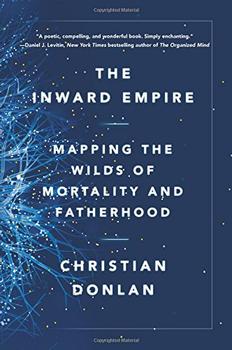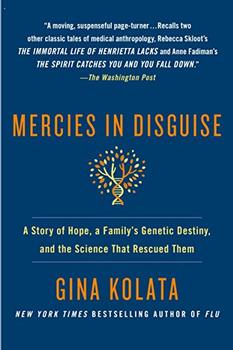Summary | Excerpt | Reviews | Beyond the book | Read-Alikes | Genres & Themes | Author Bio

Mapping the Wilds of Mortality and Fatherhood
by Christian DonlanBefore things were an eternal mess, Christian was ordinary. He was a journalist, he was married, he didn't understand the six word joke a man walks into a bar. This joke, often repeated by victims of Multiple Sclerosis (MS), makes whimsical light of their very real symptoms, such as stumbling into doors and vision troubles.
In 2012, Christian wasn't yet one of the afflicted. He didn't feel odd and he wasn't burdened by an unraveling memory that seemed to be stitched to nothing. He had just purchased a 1930s cottage in Brighton, England that was in need of modernization, upgrading and erasing mold. And his wife was pregnant.
It was later, when Christian was giving his newborn Leon a bath, that he noticed strange things. He had to search to find the doorknob. He felt a peculiar sensation throbbing in his chest. Prone to panic and anxiety, he thought he was having a heart attack but that was much too simple an explanation. He wasn't dying. Instead, his abnormal immune system was ruining his neurons; his brain's myelin – the sheath around the nerve fibers that controls the speed of impulses – were becoming damaged. Christian was living with a persistent intruder, a stranger that would not disappear.
At first Christian was treated for a vitamin deficiency and then, later, diagnosed with a swollen spine. But when his symptoms persisted – a farrago of surges down his spine that felt like a train running through his nervous system – he knew all was not well. He was clumsy, and his fingers felt odd. His voice quivered. He drooled.
Years earlier, his brother Ben had a brain tumor. When Ben finally came home to recover, Christian was a witness to his anger as he came unglued. When Christian's MS was at its peak, when he was annoyed and cynical and bitter, when he couldn't feel his hands and walked outside with undone trousers, when he yelled at his toddler because she wasn't moving quickly enough, and when he sobbed, Christian was transported back to how Ben suffered. He began to feel like he was in a room without doors. He wanted to get out but couldn't and, instead, kept roaming around in circles. He was an accidental tourist in a country he could not stand but he was not allowed to leave. MS is an island that harbors lost men.
But fatherhood made it palatable. It was rewarding for Christian to nurture a child who needed him as much as he needed her. Because his sick brain was seeing strangers who were not there, he was better able to see the world through Leon's creative eyes, her healthy brain imagining purple cows. While she explored the world around her, he chose to be curious and courageous and explore this new world inside of himself.
If Christian's memoir can be distilled down to just one thing it is that a disease of the brain is practice. It takes time to understand and patience to learn to live with. The Inward Empire, Mapping Out the Wilds of Mortality and Fatherhood is exemplary because it is not the story of an incurable disease, but of a calamitous diagnosis making landfall within a family. Where does illness stop, and humanity begin? As Christian reflects on his health and vulnerability, he makes note of the emotional toll: with illness there can be the beauty of discovery along with the great peril. For him that means focusing on raising his beautiful child while living with an incurable disease. It's a credit to his skill as a writer and thinker that a memoir of MS isn't bleak. Bittersweet? Yes. Tragic? No. Full of wisdom? Yes, a ton of it – but then he is the son of a former monk. His story is of the daily persistence to not give in, an anthem for the sick.
Being a good father was Christian Donlan's dream come true. Being a healthy man, though, is, perhaps, only a dream.
![]() This review
first ran in the June 20, 2018
issue of BookBrowse Recommends.
This review
first ran in the June 20, 2018
issue of BookBrowse Recommends.

If you liked The Inward Empire, try these:

by Theodore H. Schwartz
Published 2024
A popular biography of brain surgery, by one of its preeminent practitioners.

by Gina Kolata
Published 2018
The phone rings. The doctor from California is on the line. "Are you ready Amanda?" The two people Amanda Baxley loves the most had begged her not to be tested--at least, not now. But she had to find out.
Your guide toexceptional books
BookBrowse seeks out and recommends the best in contemporary fiction and nonfiction—books that not only engage and entertain but also deepen our understanding of ourselves and the world around us.